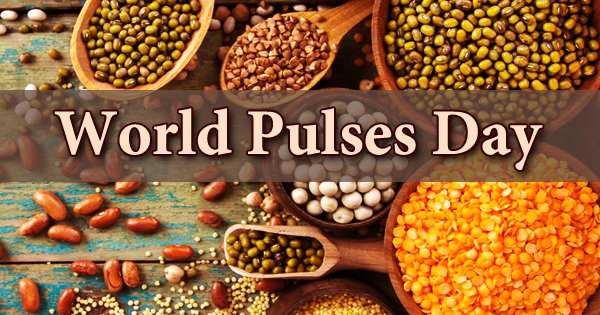Pulses, also known as legumes, are the edible seeds of cultivated leguminous plants. Pulses include dried beans, lentils, and peas, which are the most well-known and eaten. The United Nations General Assembly decided in 2019 to dedicate a day to pulses in order to raise global awareness and access to pulses, called “World Pulses Day.” The Food and Agriculture Organization (FAO) of the United Nations (UN) founded World Pulses Day, which takes place every year on February 10 and recognizes pulses as a global food. Pulses appear in a variety of staple dishes and cuisines around the world, from Mediterranean hummus (chickpeas) to a traditional full English breakfast (baked navy beans) to Indian dal (peas or lentils). Green-harvested crops (e.g., green peas, green beans) are known as vegetable crops and are not included in the category of pulses. Crops used primarily for oil extraction (e.g., soybeans and groundnuts) and leguminous crops are grown solely for sowing are also excluded (e.g., seeds of clover and alfalfa). People make efforts to raise awareness about the value of pulses in sustainable food production on World Pulses Day. Pulse donations are made to help those who do not have easy access to them. Pulses are low in fat and high in soluble fiber, which can help regulate blood sugar and lower cholesterol. They are recommended by health agencies for the treatment of non-communicable diseases such as diabetes and heart conditions because of these attributes. Pulses have also been shown to help in the fight against obesity. Since they need little fertilizer to grow, pulse crops have a lower carbon footprint than most foods. They have a low water footprint and can withstand drought stress because they are adapted to semi-arid conditions. Pulses are cheap, easy to store, and highly nutritious, and their ability to improve the soil microbiome has been instrumental in improving farming techniques in low-income rural areas.
Pulses are an important crop for farmers because they can sell and eat them, which helps them maintain household food security and economic stability. After acknowledging the importance of pulses in 2013, the United Nations General Assembly designated 2016 as the International Year of Pulses (IYP). The United Nations’ Food and Agriculture Organization (FAO) raised public awareness of pulses’ nutritional and environmental benefits. Burkina Faso (a landlocked country in West Africa) suggested World Pulses Day after the International Year of Pulses ended. The United Nations General Assembly designated February 10 as World Pulses Day in 2019. It was declared by the United Nations General Assembly at its seventy-third session in December 20, 2018. The aim of the date is to draw attention to activities and information related to the pulse industry around the world. Pulses are important for a balanced diet. Take advantage of this day to raise awareness about pulses’ contribution to sustainable food systems and a balanced food cycle. Pulses’ nitrogen-fixing properties boost soil fertility, which improves and extends agricultural production. Farmers can foster farm biodiversity and soil biodiversity while holding harmful pests and diseases at bay by using pulses for intercropping and cover crops. Pulses may also help to mitigate climate change by reducing reliance on synthetic fertilizers, which are used to artificially add nitrogen into the soil. The production and application of these fertilizers emit greenhouse gases, and their overuse can be harmful to the environment. World Pulses Day is an opportunity to raise awareness about the nutritional benefits of pulses as part of a long-term food development strategy aimed at food security and nutrition. Pulses and legumes (lentils, peas, chickpeas, beans, soybeans, and peanuts) are both essential for maintaining and improving health. Pulses are important in highlighting issues such as hunger, food security, poor health, and climate change. The official classification is also related to the UN’s 2030 Agenda for Sustainable Development, which is an ambitious collection of common and transformative Sustainable Development Goals aimed at strengthening universal peace. The 10th of February is declared as World Pulses Day, with the aim of recognizing and emphasizing the value of pulses and legumes as a global food. It’s a good time to raise money and donations. Pulses are part of the cultural heritage of many countries and are consumed on a regular or even daily basis. They are rarely mentioned in other parts of the world unless they are served in soup on a cold winter day. Since the dawn of time, these small, multicolored seeds have been one of nature’s most nutritious foods.
















